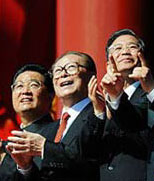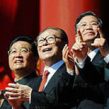
Jiang Zemin Casts Long Shadow over National Day Parade
Publication: China Brief Volume: 9 Issue: 20

While the extravaganza that marked the 60th birthday of the People’s Republic of China (PRC) seems to have convinced the world of the economic and technological prowess of the fast-emerging quasi-superpower; fissures and institutional malaise within the Chinese Communist Party (CCP) have also been laid bare. In an apparent attempt to stir up the patriotism of 1.3 billion Chinese, President Hu Jintao rolled out state-of-the-art missiles and jet fighters in the country’s largest-ever military parade. The pomp and circumstance were also designed to mark the pinnacle of the career of the 67-year-old party General Secretary and Commander-in-Chief. For many spectators, however, the most memorable image of the October 1 gala was ex-president Jiang Zemin’s re-emergence into the national limelight. The jovial face of the 83-year-old Jiang, who no longer holds any official position, appeared on CCTV’s live broadcast of the show more than 20 times. In addition, as the “party and state leaders” made their appearance in the haloed rostrum of Tiananmen Square, Jiang was just one step behind Hu—and way ahead of the eight other serving members of the Politburo Standing Committee (PSC). In a manner that rendered inevitable Jiang’s place as second in the pecking order, the People’s Daily put two equally big pictures of Hu and Jiang on the front page in its October 2 edition (Deutsche Presse-Agentur, October 2; Straits Times [Singapore], October 2).
Why the sudden prominence for Jiang, who retired from his last significant post of chairman of the CCP Central Military Commission (CMC) in September 2004? Bao Tong, a liberal aide to late party chief Zhao Ziyang, surmised that the party leadership wanted to stress “the seamless continuation of policy from generation to generation.” Indeed, part of the October 1 spectacle consisted of four larger-than-life picture placards—those of Mao Zedong, Deng Xiaoping, Jiang and Hu—being paraded in the Square and receiving thunderous cheers from onlookers. Yet, Hu seemed to resent being upstaged. He wore the sternest of expressions throughout the jubilee. Beijing-based Party veterans familiar with factional intrigues in the CCP have pointed out that while Jiang, who still heads the CCP’s powerful Shanghai Faction, was forced to quit the CMC five years ago, he has not totally relinquished power. For example, Jiang maintains a well-appointed office in the August First Building in western Beijing, which houses the CMC Headquarters. Moreover, since most of the ten generals sitting on the CMC owed their promotion to Jiang, the octogenarian often had tête-à-têtes with his former underlings in his gigantic office (Apple Daily [Hong Kong], October 2; Asiasentinel.com, October 5).
Jiang Zemin, who headed the CMC from 1990 until 2004, began putting in more appearances in the August First Building after March of last year, when scores of riots began to rock the Tibet Autonomous Region (TAR) and four neighboring provinces (Far Eastern Economic Review, April 2008). Apart from advising CMC members on how to handle ethnic violence in Tibet and Xinjiang, Jiang apparently played a role in supervising the reconstruction of Sichuan after it was devastated by an earthquake on May 12. This became known thanks to a long article written by People’s Liberation Army (PLA) Chief of the General Staff General Chen Bingde on the army’s contributions to disaster relief in Sichuan. General Chen’s piece cited five occasions when he and his colleagues sought the instructions of “[CMC] Chairman Hu and a CMC leader.” “We are determined to use all means—and to spare no efforts—to implement the instructions of Chairman Hu and the CMC leader,” Chen wrote in the People’s Daily late last year (People’s Daily, December 8, 2008). This unnamed “CMC leader” was in all probability Jiang, who had taken good care of Chen’s career since the the latter’s days as Commander of the Nanjing Military Region in the mid-1990s. In 1995 and 1996, General Chen was the field commander of the provocative anti-Taiwan war games that were masterminded by then-CMC Chairman Jiang.
There is reason to believe that the Jiang Zemin factor was behind Hu’s decision immediately after the July 5 bloodbath in Urumqi, Xinjiang to cancel his appearance in the Group of Eight (G-8) conference in Italy and to scurry back to China. This was apparently to forestall efforts by Jiang to persuade CMC generals—as well as PSC members—that Hu’s policies in Tibet and Xinjiang were going nowhere. Apart from criticizing Hu’s strategies regarding ethnic minorities, Jiang is said to be unhappy with how his successor has promoted scores of Communist Youth League (CYL) alumna to top party and government posts. Moreover, Shanghai Faction stalwarts have, from behind the scenes, decried the scandals surrounding the businesses run by the children of several CYL Faction stalwarts (Apple Daily, October 5; TheMalaysianInsider.com, October 4).
The resurgence of Jiang’s influence testifies to the nation’s institutional sclerosis—which is the result of the stoppage of all political reforms. At stake is the orderly progression of generational change in the CCP’s top echelons. The much-noted failure of Vice-President Xi Jinping to be inducted into the CMC at the Fourth Plenary Session of the CCP last month is widely believed to be due to Hu’s determination to hang on to the commander-in-chief’s slot beyond the 18th CCP Congress (See “CCP 17th Central Committee Plenum Skips Xi Jinping and Inner-Party Democracy,” China Brief, September 24). This is despite the fact that in an apparent effort to improve his ties with Hu, Xi asked his wife, famous performing artist Peng Liyuan, to sing a specially commissioned song—“The Scientific Outlook on Development Promotes Harmony”—at the National Day concert. (The “scientific outlook on development” is a key policy initiative of President Hu and Premier Wen Jiabao.) At the 16th Party Congress of 2002, Jiang set the precedent of retiring from the posts of party chief and state president—in favor of Hu—but hung on to the post of CMC chairmanship. Given that his long-standing political foe has refused to fade into the sunset, Hu now has even more of an urgency to tighten his grip on military power beyond the 18th Party Congress. After all, the head of the CYL Clique has to ensure that when he leaves the Politburo and its PSC in 2012, enough of his protégés and cronies can be appointed to the supreme council (Apple Daily, September 21; Ming Pao [Hong Kong], October 2).
Given the CCP leadership’s preoccupation with factional intrigue as well as socio-political stability, it is perhaps not surprising that President Hu’s October 1 message contained precious little on the future directions of political or institutional reform. This is despite the fact that after noting how “only socialism can save China,” Hu, who was the sole leader wearing a Mao tunic, reiterated, “only reform and opening up can ensure the development of China, socialism and Marxism.” Yet what Hu meant by “reform and opening up” had nothing to do with norms and values taken for granted worldwide. Said renowned artist and social critic Ai Weiwei, one of the designers of Beijing’s Bird’s Nest Olympics Stadium, “The party has been in power for 60 years, but their propaganda is still the same—so poor and sad.” In the run-up to the celebrations, a host of dissidents were forced to leave Beijing or kept under 24-hour surveillance. The authorities also banned famed historian Xiao Jiansheng’s Chinese Civilization Revisited, even though the book had little to say about present-day politics. Several moderate intellectuals were not even allowed to leave China to attend seminars held in Hong Kong to mark the PRC’s 60th birthday (BBC News, September 28; AFP, October 1; Xinhua News Agency, October 1).
In an apparent attempt to bolster his credentials as a worthy successor of the Great Helmsman, President Hu made sure that Mao-related themes and slogans dominated the festivities. A “Mao Zedong Platoon” stole the limelight during the “parade of the masses” the morning of October 1. Consisting partly of students from Tsinghua University, Hu’s alma mater, this super-patriotic group held high a placard that proclaimed “Long live Mao Zedong Thought.” It was the first time in recent memory that this Cultural Revolution-era mantra was given such national prominence (Ming Pao, October 5; Chinareviewnews.com [Hong Kong], September 28). Moreover, the official media was replete with stories about Mao’s family members. For example, Mao Xinyu, 39, who is Mao Zedong’s grandson and a Vice-Director of the War Theory and Strategic Studies Department of the PLA Academy of Military Sciences, is set to be made the country’s youngest major-general next year. Senior Colonel Mao also told domestic journalists that he hoped his grandfather’s birthday would become a national holiday to mark his gargantuan contributions (New York Times, September 28; China Daily, September 29).
For quite a number of liberal intellectuals and party members, however, the most thought-provoking image from last week’s parade was that of former premier Zhu Rongji. The camera caught the 81-year-old Zhu standing silently at the Tiananmen Square rostrum together with two fellow former PSC members, Song Ping, a former mentor of President Hu’s, and Wei Jianxing, who used to be in charge of the CCP’s anti-graft watchdog. Unlike almost all CCP dignitaries, who were putting on red ties, Zhu wore a black cravat—in addition to a pair of dark glasses and a poker face. Unlike Jiang, Zhu faded totally out of the limelight the moment he ceased to be head of government in March 2003. Speculation that he is not exactly happy with either Jiang or Hu seems to have been confirmed when he recently published Zhu Rongji in Press Conference, an anthology of his media interviews, which became an instant bestseller. Several provincial newspapers as well as bloggers have cited one of Zhu’s best-known sayings, “My only hope is that after retirement, the people will say ‘he is a Mr. Clean’—and I’ll be satisfied” (Chinaelections.org, September 24; China News Service, September 6). Given the opacity of Chinese politics, whatever went through Zhu’s mind on October 1, or what message Jiang wanted to send with his high-profile reappearance—may only be revealed by posterity.





